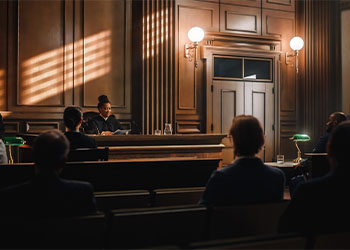What to Expect at Trial
March 20, 2023
 If you have been accused of a crime in Texas, it is crucial to understand the process that lies ahead of you, especially if your case proceeds to trial. Knowing what to expect can help you prepare for the upcoming court hearings and be better informed about how to protect your rights.
If you have been accused of a crime in Texas, it is crucial to understand the process that lies ahead of you, especially if your case proceeds to trial. Knowing what to expect can help you prepare for the upcoming court hearings and be better informed about how to protect your rights.
Criminal defense attorney Mekisha Jane Walker can advise you on proper legal etiquette and strategies to protect your rights throughout every stage of your court procedures. With an office in Houston, Texas, attorney Walker represents individuals facing criminal charges throughout Montgomery, Fort Bend, Harris, Galveston, and Brazoria Counties.
Understanding the Criminal Trial Process
Facing criminal charges in Texas can be daunting, but understanding each step in the process can help you gain confidence and peace of mind when navigating it. The following is an overview of the criminal trial proces:
Investigation and arrest. The first step in the criminal process is an investigation by law enforcement which can include interviewing witnesses, obtaining search warrants, or gathering other evidence in order to build their case against you. Once they feel they have enough evidence, they will make an arrest.
Arraignment and bail or bond. At this stage, you will be brought before a judge who will read the charges against you and allow you to enter a plea (guilty or not guilty). The judge may also set bail or bond at this time, depending on the severity of your charges. However, if no bail is set, you must remain in jail until your next court date.
Indictment. If there is sufficient evidence against you after your arraignment hearing, then prosecutors may decide to seek an indictment from a grand jury that would officially charge you with a crime(s). An indictment does not necessarily mean guilt, but it does mean that prosecutors believe there is sufficient evidence for formal charges to be made against you.
Pre-trial hearings. Pre-trial hearings are held prior to trial in order to resolve any legal issues, such as suppression of evidence or dismissal of charges before going before a jury. Your criminal defense attorney can represent and advise you throughout these hearings, as well as negotiate plea bargains with prosecutors if necessary.
Plea bargaining. Plea bargaining involves negotiating with prosecutors for less serious sentences in exchange for pleading guilty or no contest instead of taking your chances at trial, where harsher sentences could be imposed if found guilty beyond a reasonable doubt.
Trial and verdict. If the parties do not agree on terms through plea bargaining, then the case will go to trial, where jurors will determine whether the defendants are guilty beyond a reasonable doubt based on the evidence presented at trial by both sides.
Steps to Take Before Your Trial
Before the trial begins, it’s important to know what steps need to be taken. These include gathering evidence and witnesses, filing motions, meeting with your criminal defense attorney, and preparing for pre-trial hearings. Your attorney can help you build your case and ensure that all evidence is gathered before court proceedings begin. This will help equip you with all the information you need to make informed decisions during your trial.
What to Expect at Your Trial
Your trial begins with jury selection. In Texas, there are 12 jurors for jury trials in district courts and only six jurors for jury trials in probate courts, municipal courts, and county courts.
After jury selection, both sides present their cases by calling witnesses and introducing evidence. During this stage, each side has an opportunity to ask questions and make arguments based on their own interpretation of the events that led to the trial. Once both sides have presented their cases, closing arguments are made by each side’s attorney, and then deliberations begin. After deliberation, a verdict is rendered by the jury, which determines your guilt or innocence.
Steps to Take Following Your Trial
Once a verdict is reached in a criminal trial, there are still steps that may need to be taken following the trial. If found guilty, sentencing may occur immediately or may be set for another date. If found not guilty, other options, such as appeal or acquittal, may become available depending on the circumstances surrounding the case.
Don’t Risk Your Future. Call Now.
Going through a criminal trial can be intimidating, but hiring an experienced lawyer can make navigating this process much easier. If you are facing criminal charges in Texas, do not risk your future. Reach out to Mekisha Jane Walker’s office in Houston, Texas, to schedule a free consultation and discuss your case.